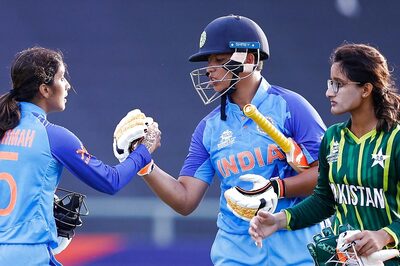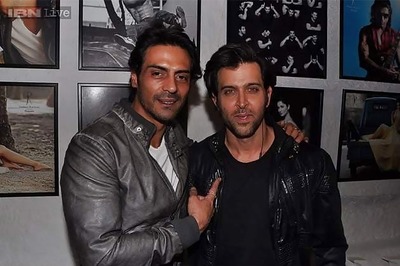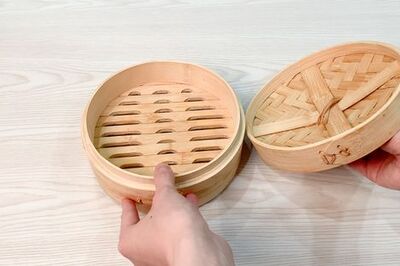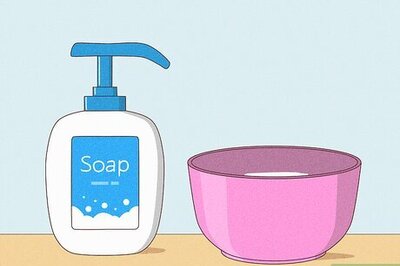
views
Rani Rampal’s team, usually clad in blue, stepped out in bright white jerseys for a crucial semi-final knockout against Argentina. For the bronze medal game against Great Britain, the blue jerseys were back. A gritty fight back ended 3-4 down for Team India. The switch in colour had no impact on the spirit or skill on display in the competition, which stepped to a new level over four quarters. Australia was the first to feel the heat in a 1-0 quarter-final upset, as a fit, fast and slightly over-confident rival paid a price for the haughty approach against Asian opponent, triggering emotions rarely seen in Indian sport. Argentina was humbled, before 2016 Rio champion GB sneaked ahead in the fourth quarter and snatched the bronze.
Fourth at the 1980 Moscow Olympics when women’s hockey made a debut as a medal event. Twelfth at 2016 Rio Olympics on just the second appearance after qualifying. Fourth again at 2020 Tokyo Olympics, played in 2021. The learning curve continues and with sustained exposure, Team India which brought so much joy to an entire nation in pandemic times, can only get sharper. Watching Rani’s army cross a new frontier (the first time India women won a knockout round at the Games and came into contention for a medal) was Padmashri awardee, Eliza Nelson, far away in Pune, trying to comprehend the significance of the team achievement.
She wondered how the flair, fitness, fervour displayed on the turf would impact the sport she dearly loved. The victory over Australia and Argentina had sparked celebrations on the pitch and back home as players’ families, former internationals, celebrities in other sports and the public watched as if in a trance. Eliza praised the Tokyo tearaways under chief coach Sjoern Marijne.
“The Rani Rampal-led team is a totally committed squad who have worked hard right through the last five years, including the pandemic period. These girls deserve full praise.” The right winger’s debut Olympic appearance came in 1980 and her team lost the bronze medal game in controversial circumstances.
For women’s hockey in those days, match play was easier to handle than surviving the preparations which she explained. India lifted the hockey gold, under her captaincy, two years after Moscow at the 1982 Asian Games and she is aware of the effort taken to build a winning unit. With so much effort put into the match against GB, the emotional reaction by India on the pitch after the narrow loss was understandable.

Excerpts from a chat with a successful captain, former star forward for Indian Railways:
From where did this never-give-up feeling come into this 2021 group? The comeback in the bronze medal tie was one of many examples….
Pep talk from their coach and support team gives them confidence. The match against GB was another brilliant fightback, sad that we lost. To go down two goals, then to equalise was amazing. Team India women won the hearts of the nation, matched their rival in speed and fitness right till the fourth quarter. The team definitely made their mark on the world stage and created awareness in India. I am waiting for the next Olympic Games (Paris 2024) to happen.
After the team returns, any suggestions on how to use the happy mood for hockey to popularise the sport among the people? The players did their part…
The people of India are all praise of the men and women hockey teams. We should capitalise on the moment, after the players have rested and recovered, by bringing them together again as a group to visit the states which have sports hostel culture. The 2020 Olympians can give young players a pep talk of the benefits of being a good sportsperson and what is expected at the top. Today if one has a national representation certificate, job opportunities are available in the public sector. The Indian Railways have recruited thousands of sportspersons all over in different disciplines. I am proud to point out that the Indian hockey teams in Tokyo had 13 players from the Railways. Private and public companies need to revive hockey teams now.
Hockey on artificial surfaces is an expensive sport to play, so state governments taking steps to subsidise the cost of hockey sticks, shoes and arranging decent playing pitches will be useful in the long run.
Odisha is an example of how investment in sports infrastructure is a win-win situation. Schools and college-going students and parents should know that hockey is a career option now, with the right moves at the right time. More hockey round the year in schools and colleges, more inter-schools, inter-college and age group tournaments will create numbers to have more players to choose squads. Strictly enforcing age checks will encourage more interested kids to continue playing.
Hockey keeps changing with time. Any new developments in the sport and the way it is managed here worth commenting about?
Being in sync with the foreign coach counts a lot. Thankfully he has been with the team over a long duration, it helps players to understand him and vice versa. In the 80s, every camp would see the addition of a new coach. The striking difference between the 1980 and 2020 is in terms of involvement from the government, the national hockey federation. State governments like Odisha sponsor India men and women’s hockey. Team India players in Tokyo and in recent times are getting more exposure tours internationally, the women can assess their strengths and weaknesses against foreign teams in a professional way. Fitness levels have improved and we are equal to the best in the world. Training camps in our times would have just two coaches. There is a whole support system arranged, in the form of a goalkeeper coach, analytical coach, video analyst, physio, trainer, recovery specialists, dietician, sports medicine people. Having said that, I am taking nothing away from the players’ efforts. The sacrifices made by them to achieve their target. Most of the players come from very humble backgrounds. They have seen parents struggle and having made it to the national team, are doing their best to improve the condition of their family as well.
Women’s hockey entry into the Olympics happened in Moscow 1980. It is learnt that you and teammates were in sight of a bronze medal way back then…what happened on and off the pitch?
The Moscow Olympics was a different story altogether. To start with, the national coaching camp on the hard mud surface at SRPF ground (Pune). From there we went to play in Moscow on artificial turf. We were housed in the barracks which was really hot, so rest and recovery was tough. The Indian team was sent for the Games without a hockey coach. Kartar Singh who accompanied us was a better administrator. The team had no proper kit, we were all in different colours. We reached Moscow about 10 days in advance, but instead of using the time to get familiar with the turf, ended up getting exhausted before the event started. Teams were expected to share practise time on the turf. There was no proper practise schedule fixed with the ground management, we wasted time in transportation to the ground and back, waiting for our turn to train and spending time wearing our kit the whole day.
India is supposed to have lost the placing match (Russia won 1-0) in controversial circumstances. Can you elaborate?
Zimbabwe won the gold medal. In our match against them earlier in the league, a goal was scored against us off a rebound where the ball came into play after hitting the outside post. There was no video referral in use then to see a changed decision. To file a protest against the umpire decision, 100 dollars was to be submitted, which our team management did not have. Just imagine, if the goal had been disallowed and the result had later gone our way, India would be playing for the first two positions. We ended up playing for the bronze instead. Before this match started, our coach told us that players in the extras list were included in the line-up. It seems only those who had stepped on the pitch in the competition would get a medal, in case we went on to win the bronze. In those days, only two substitutes were permitted, unlike the rolling substitution now. The team combination got disturbed.
The 1982 Asian Games gold made India happy. Did Moscow miss fire up the squad, captained by you?
The great Balkishen Singh was in charge as our new coach for the Asian Games. The Asics company hockey kit was given to us, knowing our medal potential, it proved very useful. A few seniors had left, new faces had come in and alongside most from the Moscow squad. We trained together for three years, toured Japan under the same coach and won the gold in New Delhi. As team captain, I felt happy to bring joy to our nation. Let us make the Tokyo batch feel special for their whole-hearted effort.
Read all the Latest News, Breaking News and Coronavirus News here.



















Comments
0 comment